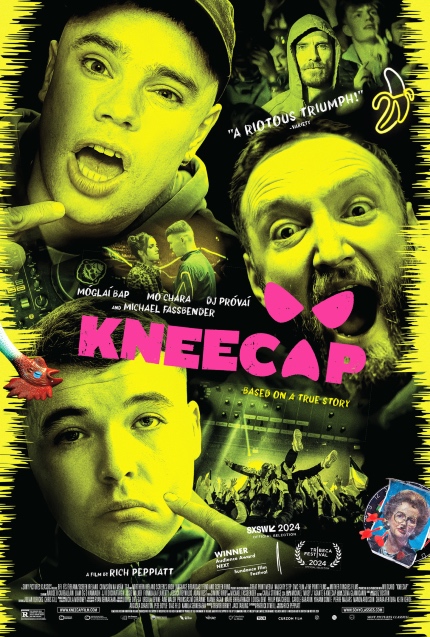KNEECAP Review: Anti-Imperialist Dramedy with Rap, Sex and (Possibly) Record Breaking Cursing

The winner of this year’s Sundance Audience Award is hitting theaters and, just as the name of the prize suggests, it's bound to be a major delight for viewers.
Rich Peppiatt’s Kneecap, a feature debut film about an actual Irish rap band by the same name, is bold, entertaining and boisterous – both as a cinematic piece and as a statement. It is also genuinely hilarious, which isn’t that uncommon for a crowd-pleaser. What is pretty rare though, is that a crowd-pleaser would also happen to be political and unapologetic about it.
JJ (JJ Ó Dochartaigh aka DJ Próvai) is a teacher at a Belfast school, leading a nice, comfortable life that leaves him just slightly discontent. His girlfriend Caitlynn (Fionnuala Flaherty), an activist fighting for Irish language to be recognized as the country’s official language, is woken up in the middle of the night by the police asking her to come and translate for some detained man who refuses to speak English.
She believes he might be making an important statement in the current climate, but can’t go herself. JJ goes in her stead and thus, meets Liam (Liam Óg Ó Hannaidh aka Mo Chara), a small-time drug dealer and a hip-hop enthusiast. He and JJ establish a quick rapport thanks not only to their ideological stance on language use, but also to the lyrics scribbled in Liam’s notebook.
Soon, JJ convinces Liam and his best pal Naoise (Naoise Ó Cairealláin aka Móglaí Bap) to make music together in his garage, arguing that rapping in Irish is a kind of statement that needs to be made in the name of the good fight. While their new band, sporadically named Kneecap, gets more and more attention from all kinds of parties (not all of them well-meaning), JJ tries to hide his true identity for fear of imploding his life and losing his girlfriend.
Liam is navigating a complicated romantic relationship with a lovely, foul-mouthed Georgia (Jessica Reynolds). And Naoise deals with the legacy of his father Arló (Michael Fassbender), an IRA fighter who sacrificed his familial relationships many years ago by faking his death.
As indicated by the names, Rich Peppiatt’s film is a highly fictionalized and dramatized origin story of the Kneecap band where the guys, err, lads basically play versions of themselves. All three have a great onscreen presence and the uncanny ability to come off as easily funny and genuine.
Michael Fassbender obviously transmits a big presence too, even in his limited time on screen, but never overshadows the real – literal – stars of the show. In some way, Fassbender’s character, serious as a heart attack but also spewing bombast stuff that borders on self-parody, is indicative of the movie’s general tone. Peppiatt’s film too generates a lot of laughs but at the same time comes off as serious and packing an emotional punch when needed.
The direction by Rich Peppiatt also corresponds both with the style of the band and with the stance all main participants here seem to share. Kneecap -- the film -- boasts a vivid sound design, fast and furious editing and some creative use of the locations incorporating Belfast’s famous murals into the narrative.
At the same time, the movie keeps circling back to the idea of any kind of art always being not only cultural but political, and of a language being an integral part of identity, a person's or a nation's. The Kneecapers like to joke that this is a movie with a franchise potential (standby for Kneecap. Part 4: The Revenge of Arló!). But in all honesty: keep’em coming, lads, this is the kind of a multiverse thing we actually need.
The film opens today in North America, exclusively in movie theaters, via Sony Pictures Classics. Visit the official site for locations and showtimes.







